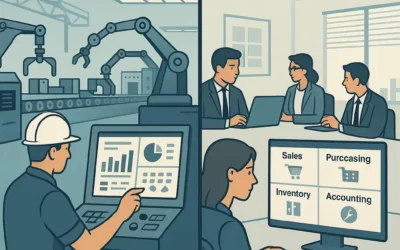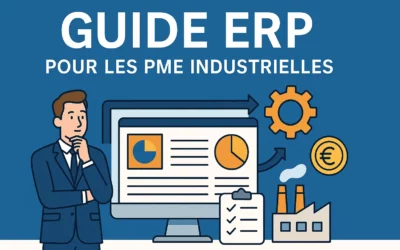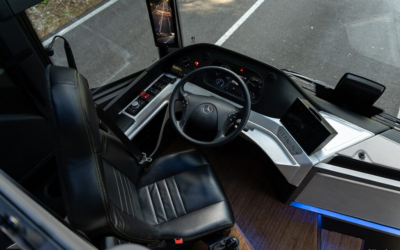ERP / PGI: the complete guide for industrial SMEs
Gaining efficiency, traceability and profitability: these are the promises of a good ERP.
But between technical jargon, commercial promises and industrial reality, how can you find your way around?
This article was designed as a practical and educational guide, intended for managers and directors of industrial SMEs considering or undertaking an ERP project.
You will find clear explanations, concrete examples, the key stages of an ERP project and above all: answers to the real questions you are asking yourself.
Summary
- What is an ERP?
- What is the use of an ERP in an industrial SME?
- What are the key features of an industrial ERP?
- How to choose the right ERP for your SME?Exit the Visual Builder
- Stages of an ERP project: from analysis to deployment
- ERP: what concrete benefits for industrial SMEs?
- FAQ – ERP / PGI: what you need to know
- Conclusion: ready to develop your industrial management?
What is an ERP?
Simple definitions and distinctions
An ERP (Enterprise Resource Planning) – or in French PGI (Integrated Management Software) – is software that allows you to centralize and manage all of a company's key processes: production, purchasing, sales, inventory, finance, quality, HR, etc.
Example: In a plastics SME, the ERP manages manufacturing orders as well as invoicing, planning, material traceability and customer mold stocks.
Why do we also talk about ERP?
The term ERP is more commonly used in France, but ERP is now the most common term in industry. Both refer to the same thing: an integrated, modular, and scalable system.
What is the use of an ERP in an industrial SME?
Centralization of information
ERP eliminates silos. All data is centralized in a single database: no more duplicates, scattered Excel files, or loss of critical information.
Production and purchasing management
ERP allows you to plan and monitor production in real time, manage supplies based on real needs, and optimize stocks.
Improved lead times, quality and profitability
With better visibility and coordination, you reduce delays, waste, and improve overall business performance.
What are the key features of an industrial ERP?
Production management (CAPM)
- Nomenclatures, ranges, manufacturing orders
- Monitoring of work in progress, rejects, TRS
- Calculation of cost prices
MES, traceability, planning
- Real-time workshop monitoring (MES)
- Material and process traceability (labels, batch number)
- Fine planning/scheduling by position or resource
GALION example: Traceability is reinforced via automatically printed labels, with a link between OF, material, supplier batch and serial number.
Purchases, sales, stocks, finance
- Management of purchase requests, orders, receipts
- Quotes, customer orders, delivery notes, invoicing
- Multi-warehouses, inventories, stock valuation
- Cash flow monitoring, analytics
Business Intelligence (BI)
- Real-time dashboards
- Custom indicators by service
- Decision-making assistance
How to choose the right ERP for your SME?
Take into account your sector and your challenges
Your ERP must adapt to your business, not the other way around. An ERP designed for industry integrates the specificities of your workflows:
- Made to order / made to stock
- Multi-level nomenclature
- Management of tools or molds
- Certifications, customer audits
Business ERP vs. general ERP
A general-purpose ERP can require a lot of specific development. A business ERP like GALION Solutions is already designed for industry, which makes deployment and handling easier.
The role of the integrating editor
A good integrator knows your business. GALION is a publisher-integrator: a single point of contact, personalized support, and complete control of the solution.
Stages of an ERP project: from analysis to deployment
Framing of the need and specifications
An essential phase to define your objectives, constraints, processes to be covered.
Choice of solution and project planning
Selection based on business criteria, demo tests, project costing, retrospective planning.
Support, training, guidance
Upskilling your teams, phased production, responsive support.
Example: At a mechanical subcontractor, the GALION deployment phase was divided by product family to ensure a gradual and controlled start-up.
ERP: what concrete benefits for industrial SMEs?
Productivity gain
- Fewer multiple entries
- Better coordination between services
- More visibility on the load and outstanding amounts
Traceability and compliance
- Complete quality monitoring (batch, OF, supplier)
- Rapid responses to audits and complaints
Informed decision
- Reliable dashboards
- Indicators updated in real time
FAQ – ERP / PGI: what you need to know
ERP = cloud or local server?
Both are possible. GALION offers a version installed on your servers or dedicated hosting.
How long does it take to deploy an ERP?
Depending on your size and scope, from 3 to 12 months. A good initial framework is crucial.
Is it suitable for small industrial structures?
Yes. A modular ERP adapts to your size. At GALION, we support SMEs with 10 to 200 employees.
Should you change all your tools?
No, the ERP can interface with certain existing software (accounting, payroll, etc.) via connectors or APIs.
Conclusion: ready to develop your industrial management?
An ERP adapted to your sector saves you time, increases profitability and gives you peace of mind.
With GALION Solutions, you benefit from an ERP designed for industry, human support and concrete features for your performance.
Looking for an ERP for your business?
ERP or CAPM: what are the differences in the industry?
Which tool should you choose to optimize your industrial processes: ERP or CAPM? Discover the key differences between these two solutions to make an informed choice, tailored to your production and growth challenges.
ERP / PGI: the complete 2025 guide for industrial SMEs
An industrial ERP centralizes an SME's key data, improves traceability, optimizes production, and facilitates decision-making. This practical guide answers key questions managers have about how to successfully implement their ERP project and improve efficiency.
Point-by-Point Production Startup at Vision Systems
Hello everyone, 🙋♂️ 🙋♀️ Vision Systems, a division of Gauzy, is a company based in France and the United States. It designs products and...



